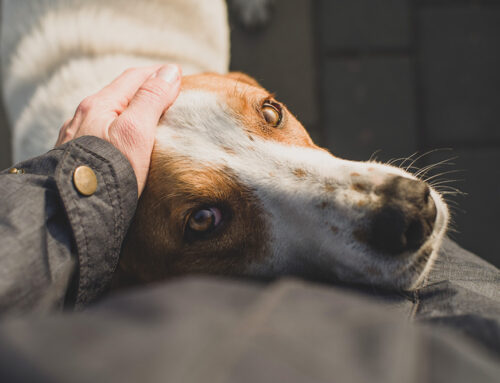Dogs have sensitive gastrointestinal tracts, and benign issues, such as a minor dietary indiscretion, can cause diarrhea, as well as more serious issues. Our team at Palm City Animal Medical Center wants to help by providing information about what causes diarrhea in dogs and when you should be concerned.
Dog diarrhea causes
Four major mechanisms can cause dog diarrhea, and multiple mechanisms may contribute to the condition, including:
- Osmotic diarrhea — The fecal water content is determined by how many osmotically active particles are present. When the particle numbers increase inside the intestinal lumen, diarrhea occurs. Conditions such as overeating, dietary indiscretions, exocrine pancreatic insufficiency, and other malabsorptive disorders cause osmotic diarrhea.
- Secretory diarrhea — Cells in the intestinal lining can be stimulated to produce large fluid volumes that exceed the intestine’s absorptive ability, causing diarrhea. Conditions such as bacterial enteropathies and inflammatory bowel disease (IBD) can cause secretory diarrhea.
- Increased mucosal permeability — An increase in the intestinal mucosa’s permeability causes excessive amounts of fluids, electrolytes, proteins, and blood to enter the intestinal lumen. Conditions such as parvovirus, intestinal lymphoma, and hookworm infections can cause this diarrhea type. IBD can also cause increased mucosal permeability.
- Abnormal motility — Decreased intestinal contractions cause ingesta to move too fast for normal digestion and absorption. Ingesting a foriegn body or gastric volvulus can cause this diarrhea type.
Small bowel dog diarrhea
Dog diarrhea can be classified according to the condition’s origin, which can help determine the cause. Small bowel dog diarrhea characteristics include:
- Amount — The dog will have an increased fecal amount, which may also have a higher water content.
- Pattern — The diarrhea may be projectile, and not involve straining.
- Blood — Any blood will be digested and appear black in color.
- Color — A yellow-green color, caused by malabsorbed bile salts, is common, but the color may be gray if undigested fat is present, or the dog is lactose intolerant.
- Weight loss — If the condition is chronic, weight loss typically occurs.
- Vomiting — Vomiting may be present, especially after the dog eats.
- Gas — Increased intestinal noises and gas are common.
- Appetite — The dog’s appetite depends on the underlying cause.
- Dehydration — In severe cases, dogs may be dehydrated, or increase their water intake.
Small bowel diarrhea causes include overeating, dietary changes, parasites, infectious enteritis, toxins, motility disorders, and certain cancers.
Large bowel dog diarrhea
Large bowel dog diarrhea characteristics include:
- Amount — The dog typically passes small fecal amounts frequently.
- Pattern — Straining is often present.
- Blood — Blood that is present will be undigested and bright red in color.
- Weight loss — Weight loss doesn’t typically occur.
- Vomiting — Vomiting doesn’t typically occur.
- Gas — Increased intestinal noises and gas are not common.
- Appetite — Usually, the dog’s appetite is not affected.
- Dehydration — Dehydration can occur.
Large bowel diarrhea causes include parasites, bacterial enteritis, dietary hypersensitivity, foreign body, IBD, stress, kidney and liver disease, and certain cancers.
When dog diarrhea is concerning
If your dog has one diarrhea episode but seems normal otherwise, you can likely manage the problem at home. But, your dog should receive veterinary care if they have the following characteristics:
- Other signs — If your dog has other signs, such as vomiting, fever, lethargy, pain, or decreased appetite, they will need veterinary attention.
- Toxin ingestion — If you know or suspect your dog ingested a toxin, you should immediately call Palm City Animal Medical Center or Animal Poison Control for expert advice.
- Foreign body ingestion — If you know or suspect your dog ingested a foreign body, they will need immediate veterinary attention.
- Bloody diarrhea — If your dog’s feces are bloody, they should be evaluated by a veterinarian.
- Chronic diarrhea — If your dog has diarrhea for two or more days, they should be evaluated by a veterinarian.
- Puppies and senior dogs — Puppies and senior dogs are at higher risk for complications, and should be seen by a veterinarian if they have diarrhea.
Managing dog diarrhea
If your dog with diarrhea shows no signs that require immediate veterinary attention, you can manage the issue at home. Tips include:
- Fast your dog — Do not let your dog eat, to allow their gastrointestinal tract to settle.
- Don’t administer medications — Over-the-counter human diarrhea medications are contraindicated in dogs, unless advised by your veterinarian.
- Feed a bland diet — If your dog doesn’t have another diarrhea bout in 12 to 24 hours, you can offer them a small amount of bland food, such as boiled chicken and rice.
- Gradually switch the diet — As long as your pet handles the bland food well, you can transition them back to their original diet over one to two days.
Preventing dog diarrhea

Not all dog diarrhea can be prevented, but you can take measures to decrease your dog’s risk. These include:
- Don’t feed your dog table scraps — Avoid feeding your dog inappropriate—especially fatty—foods.
- Gradually change your dog’s diet — If you have to change your dog’s diet, do so gradually over 7 to 10 days.
- Keep your garbage in sealed containers — Ensure your dog can’t eat discarded food by keeping your garbage in sealed containers.
- Keep your dog’s vaccines up to date — Ensure your dog’s vaccines are up to date, to protect them from diseases that can cause diarrhea.
- Provide year-round parasite prevention — Ensure your dog receives year-round parasite prevention, to protect them from parasites that can cause diarrhea.
Certain conditions that cause diarrhea can significantly affect your dog’s health, but you can take steps to decrease their risk. If your dog has diarrhea, contact our American Animal Hospital Association (AAHA)-accredited team at Palm City Animal Medical Center, so we can determine the cause and remedy the problem as soon as possible.








Leave A Comment